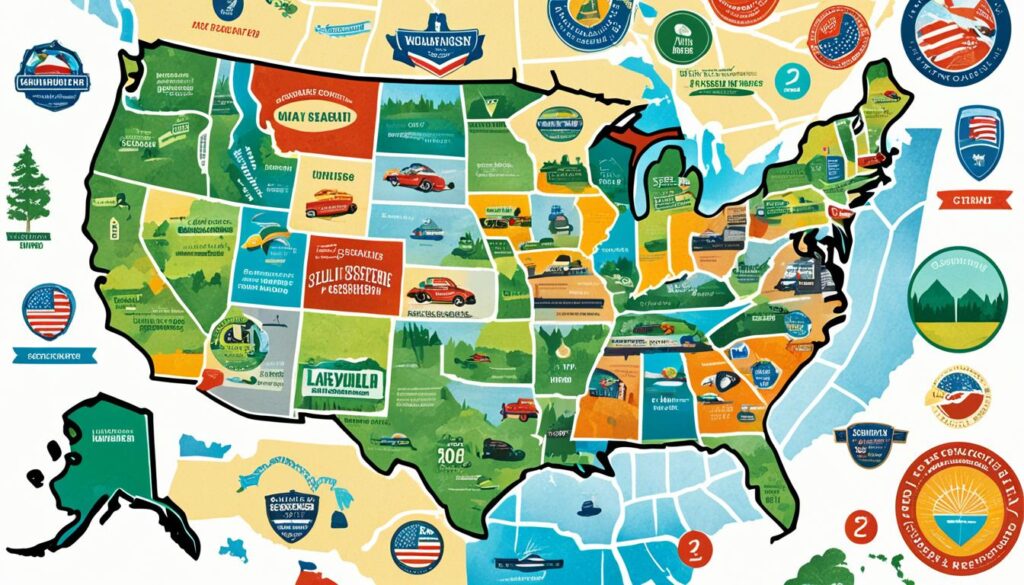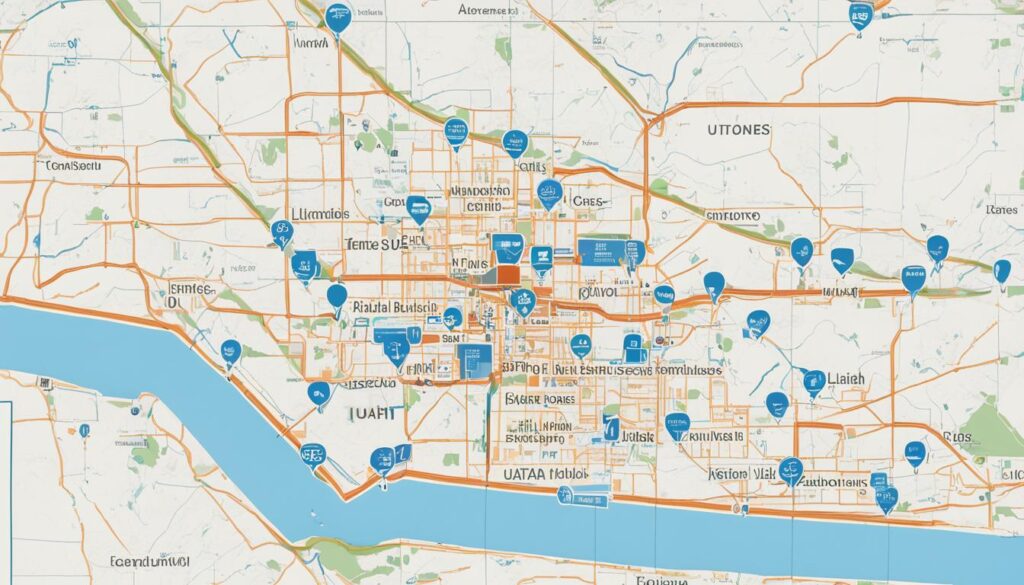Starting a lawn care business is thrilling. But first, you must know the licensing rules. Many people wonder, “Do I need a license for lawn care business?” The answer varies by location.
Most states say you need a basic business license for lawn care. Some cities ask for a landscaping business license too. It’s key to check your local laws. You might need a special yard maintenance license in some places.
Just because you’re cutting grass doesn’t mean you can ignore the rules. Getting the right license keeps you and your clients safe. It’s like how churches need licenses even if they’re non-profits. A lawn care business license means you’re running things right.
Key Takeaways
- Licensing rules change by state and city
- Most states want a basic business license for lawn care
- Some places need special licenses for landscaping or yard maintenance
- Look into local laws before you start
- Right licensing keeps you and your clients safe
- Talk to local business groups for help on what you need
Understanding Lawn Care Business Licensing Requirements
Starting a lawn care business is more than just cutting grass. You must understand lawn care regulations. These rules change by state and city, so it’s key to know what’s needed in your area.
State-specific Licensing Regulations
Every state has its own rules for lawn care businesses. Some need a general business license, while others require specific lawn care licenses. Make sure to check with your state’s department of agriculture or consumer affairs to find out what you must have.
Local Licensing Considerations
Don’t overlook local rules. Your city or county might ask for a grass cutting permit. These rules are as crucial as state laws, so do your homework.
Types of Licenses for Lawn Care Services
You might need different licenses based on where you are and what you offer:
- General business license
- Gardening service license
- Pesticide application license
- Contractor license for landscape work
Getting the right licenses is key. It keeps you and your customers safe. It shows you’re serious about running a professional, legal business. Take the time to get all the permits you need before starting your lawn care service.
Do I Need a License for Lawn Care Business: State-by-State Overview
Lawn care business licensing varies by state in the U.S. It’s key to know the laws in your area to run your business legally. Let’s look at the different rules you might face when starting your lawn care business.
States Requiring General Business Licenses
Many states need a general business permit for lawn care services. These licenses make sure your business is legal and follows local rules. Talk to your state’s business department to see if you need a general license.
States with Specific Lawn Care Licensing
Some states want special licenses for lawn care. For example, California needs a landscaping contractor license for some services. Alabama, Arkansas, and Hawaii also have their own rules for lawn care pros. Make sure to check your state’s laws to follow them.

Exemptions and Special Cases
Some states don’t require licenses for lawn care. This might be if your business makes less money or if you offer fewer services. Colorado, for example, doesn’t have state-level rules for lawn care businesses. Always check with your state’s departments to know the latest laws and avoid legal trouble.
- Check for income-based exemptions
- Explore service-specific licensing requirements
- Consult local authorities for up-to-date information
It’s vital to know about lawn care licenses and permits in your state. This helps your business succeed and stay legal.
Pesticide Application Licenses and Certifications
Running a lawn care business often means you need more than basic licenses. Many states require special certifications for handling pesticides. This is why a pesticide applicator license is important.
A pesticide applicator license is key for lawn care pros who use chemicals to fight weeds, bugs, or diseases. To get this license, you must pass an exam. This exam checks your knowledge of pesticide safety and how to apply them right.
The rules for a pesticide applicator license change by state. Some states have different licenses for general-use and restricted-use pesticides. For example, Arizona, Florida, and Georgia need specific licenses for restricted-use pesticides.
Getting a lawn care certification isn’t just a one-time thing. Many states make you take more classes and get recertified over time. This keeps you updated with the latest safety and application methods.
- Research your state’s specific requirements
- Prepare for and pass the licensing exam
- Plan for ongoing education and recertification
With the right lawn care certification, you meet legal needs and show you care about safety and professionalism in your business.
Cost Considerations for Lawn Care Business Licenses
Starting a lawn care business means you’ll face various expenses, including licensing fees. It’s key to know these costs for budgeting and planning. Let’s look at the costs of getting and keeping a lawn care business license.
Initial Licensing Fees
The cost of a lawn care business license varies a lot by location and services offered. You might pay between $100 to $500 for your first license. Some places need extra permits for certain services, which can raise your start-up costs.

Renewal Costs and Frequency
Licensing fees for landscaping aren’t just a one-time thing. Most licenses need to be renewed. Renewals can be yearly to every few years. Renewal fees are usually less than the first payment but are still a regular cost to consider.
Additional Expenses
There are more costs besides just the license:
- Pesticide applicator certification fees
- Bonding requirements
- Insurance premiums
- Continuing education courses
These costs can add up quickly. So, it’s smart to do your homework and plan well. For a detailed guide on licensing needs and costs, see this resource on lawn care business licenses. Knowing and preparing for these costs will help you start and run a successful lawn care business.
Steps to Obtain a Lawn Care Business License
Starting a lawn care business needs the right license. The process to get a lawn care business license changes by location. But, these steps will guide you through it:
- Research local requirements
- Gather necessary documents
- Complete application forms
- Pay required fees
- Pass any required exams
First, look into your state and local licensing rules. Each place has its own set of rules for lawn care businesses. Then, collect important documents like insurance and bonding. These protect you and your customers.
Fill out all application forms correctly. Make sure to pay close attention to details to avoid delays. You’ll also need to pay licensing fees, which differ by location. In some places, you might need to pass exams, especially for applying pesticides.
Start the process early, as it can take weeks or even months to get your license. Some states might want proof of experience or education in horticulture. Planning ahead makes sure you’re ready to start legally when the season comes.
Benefits of Proper Licensing for Your Lawn Care Business
Getting the right licenses for your lawn care business has many perks. It can make your business stand out and grow.
Legal Compliance and Protection
Being licensed means you follow the law. You won’t face fines or shutdowns that could hurt your business. You can work with confidence, knowing you meet all legal standards.
Enhanced Credibility with Customers
Licensing boosts trust with customers. When people see you’re licensed, they know you’re committed to quality. This trust leads to more referrals and repeat customers.
Access to Business Opportunities
Many big contracts and government jobs need licenses. With a license, you can go after these opportunities. You’ll have a chance to work on bigger projects and grow your business.
Licensing also gives you access to important resources. You can keep up with industry rules and best practices. This knowledge helps you offer better service and stay ahead.
Structuring Your Lawn Care Business: Sole Proprietorship vs. LLC
When starting your lawn care business, you have to decide between a sole proprietorship and an LLC. This choice impacts your taxes, liability, and how your business is structured. A sole proprietorship is easy to set up and lets you have full control. However, it doesn’t protect your personal assets if there are any issues.
An LLC, on the other hand, protects your personal belongings better. This is key in lawn care, where accidents or damage to property can happen. LLCs also offer tax benefits and keep your business separate from your personal life. They’re a top choice for many lawn care pros who aim to grow their business safely.
Choosing the right structure for your lawn care business depends on your goals and situation. If you’re just starting and want simplicity, a sole proprietorship might be right for you. But if you see your business growing, an LLC could be a better choice for protection and benefits. It’s wise to consult with a business expert or accountant to see which option suits your lawn care business best.
FAQ
Do I need a license to start a lawn care business?
What types of licenses are commonly required for lawn care businesses?
Are there any exemptions or special cases for lawn care business licensing?
What licenses or certifications are needed for pesticide application in lawn care?
How much do lawn care business licenses typically cost?
What is the process to obtain a lawn care business license?
What are the benefits of proper licensing for a lawn care business?
Should I structure my lawn care business as a sole proprietorship or LLC?
Author
-

David Nguyen is an expert in business licensing, with extensive knowledge in local and international regulations. His expertise is crucial for businesses seeking guidance on compliance and licensing strategies.
View all posts



